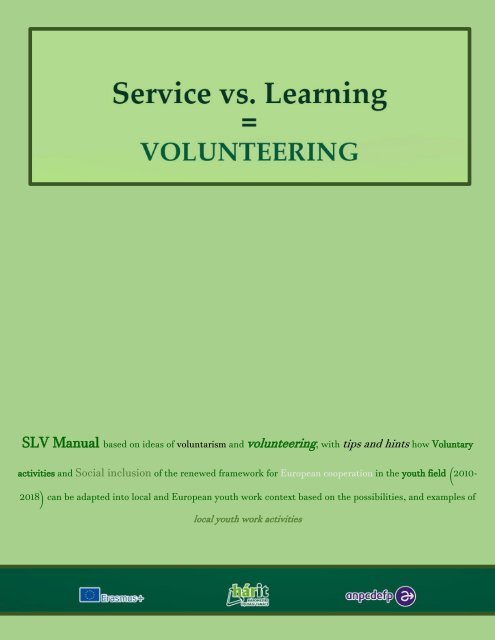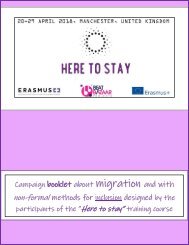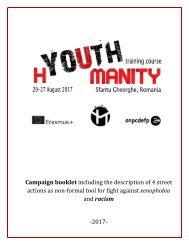SLV manual
SLV Manual created during the SLV: Service vs. Learning project, which took place in Sfantu Gheorghe, Romania between 1-10 September 2017. The project was organized by the Asociatia Tinerilor din Judetul Covasna and financed by the European Comission through the Romanian National AGency (ANPCDEFP) in the frame of Mobility of Youth Workers - Erasmus+. The E-Manual includes: Tips and hints how Voluntary activities and Social inclusion of The renewed framework for European cooperation in the youth field (2010-2018) can be adapted into local and European youth work context based on the possibilities of participants. Thoughts why voluntary activities are beneficial for young people and the members of the local communities. Scripts of the grass roots small voluntary activities based on the needs of their target group in the local community.
SLV Manual created during the SLV: Service vs. Learning project, which took place in Sfantu Gheorghe, Romania between 1-10 September 2017. The project was organized by the Asociatia Tinerilor din Judetul Covasna and financed by the European Comission through the Romanian National AGency (ANPCDEFP) in the frame of Mobility of Youth Workers - Erasmus+.
The E-Manual includes:
Tips and hints how Voluntary activities and Social inclusion of The renewed framework for European cooperation in the youth field (2010-2018) can be adapted into local and European youth work context based on the possibilities of participants.
Thoughts why voluntary activities are beneficial for young people and the members of the local communities.
Scripts of the grass roots small voluntary activities based on the needs of their target group in the local community.
You also want an ePaper? Increase the reach of your titles
YUMPU automatically turns print PDFs into web optimized ePapers that Google loves.
<strong>SLV</strong> Manual based on ideas of voluntarism and volunteering, with tips and hints how Voluntary<br />
activities and Social inclusion of the renewed framework for European cooperation in the youth field (2010-<br />
2018) can be adapted into local and European youth work context based on the possibilities, and examples of<br />
local youth work activities
Table of content<br />
1. Introduction<br />
2. Voluntarism/Volunteering in the represented countries<br />
3. Why voluntary job? What, how, who and with whom?<br />
4. Local and international possibilities in voluntary activities<br />
5. Tips and hints<br />
6. Local youth work activities
Introduction<br />
This Manual makes an attempt to present:<br />
✓ Tips and hints how Voluntary activities and Social inclusion of The renewed<br />
framework for European cooperation in the youth field (2010-2018) can be adapted<br />
into local and European youth work context based on the possibilities of participants.<br />
✓ Thoughts why voluntary activities are beneficial for young people and the members<br />
of the local communities.<br />
✓ Scripts of the grass roots small voluntary activities based on the needs of their target<br />
group in the local community.<br />
It was created and edited by the participants of „<strong>SLV</strong>: Service vs. Learning = Volunteering”<br />
training course, which took place in Sfantu Gheorghe, 01-10 September 2017. The training<br />
was organized by Asociatia Tinerilor din Judetul Cosana – HARIT and financed by the<br />
European Commission through the Romanian National Agency (ANPCDEFP) in the frame<br />
of the Erasmus+ Programme – Mobility of Youth Workers.<br />
Good luck!<br />
The team of HARIT
Volunteering in Lithuania<br />
Facts:<br />
• Age – from 14<br />
• Volunteers under 18<br />
needs parents’<br />
permission<br />
• Qualification is not<br />
necessary<br />
Who can be organizer of<br />
volunteering activities?<br />
• charity organizations<br />
• associations<br />
• public institutions<br />
• religion communities<br />
• political parties<br />
The most popular volunteering organizations in Lithuania:<br />
• Children line<br />
• 5 th Leg<br />
• Food Bank<br />
• Do it!
Facts about Volunteering in Norway<br />
History<br />
✓ Long tradition (mid 19 th cent.)<br />
- Cultural heritage<br />
- Outdoor activities<br />
- Poverty Health, Social work and Humanitarian work<br />
✓ Number of the organizations raised after 2WW<br />
Today<br />
✓ Stabile and consistent // challenge – to insure participation of all layers of society
✓ 115 000 NGOs: mainly CULTURE and LEISURE // around 88 members/org.<br />
✓ ‘The Nordic Model’ – receive funds from government BUT criticize government<br />
✓ DUGNAD – collective voluntary effort<br />
✓ Organizations are organized similar to political parties // local and regional branches<br />
with organizational headquarters<br />
✓ Association of NGO’s; Platform<br />
✓ DECLARATION of voluntary work<br />
- Recognizes and states the importance<br />
- Government support<br />
Funds<br />
✓ 1/3 from local government<br />
✓ Rest: fees, donations, selling services<br />
✓ Revenue for ½ of the organizations is bigger than 7000 euro/year<br />
-
Volunteering in Romania<br />
In 2014 government recognizes the legal status of volunteering:<br />
- Recognized as professional experience<br />
- You can get certified for volunteer activities<br />
- You have to have official contract and time schedule with<br />
description of your tasks with the NGO/institution/etc.<br />
- under 14 you need parental permission<br />
BUT:<br />
- you can not get paid (only you can benefit from accommodation<br />
-<br />
and food in some cases)
- you must declare your exact position/role inside of the<br />
association<br />
- you have to show your medical and criminal records<br />
Volunteering activities are mainly focusing on:<br />
- humanitarian acts, like Red Cross<br />
- animals<br />
- community<br />
- youth<br />
Volunteering activities can be done in several fields of action, basically you can<br />
do EVERYTHING (Save Bears, help homeless animals, do anything for<br />
children and youth, student councils, political parties, and so on…)
Volunteering in Italy<br />
Main fields who are offering volunteering possibilities:<br />
1. Cultural organizations<br />
- Events/festivals<br />
- Eco-cleaning days / environment<br />
- Cultural and traditional<br />
- Active citizenship<br />
2. Sport<br />
- Football<br />
- Dance<br />
- Karate
3. Assistential/Health “ONLUS”<br />
✓ All of them have some specific rules in particular for the fiscal<br />
part according to the topic<br />
✓ We don’t have a unic or specific law for voluntarism<br />
✓ Sometimes it is complicated to find the proper specific law for<br />
your organization
Volunteering in Malta<br />
LAW<br />
✓ There is a Voluntary Organization act (VO)<br />
✓ There is a Commissioner who decides who is an NGO<br />
✓ One needs a Number to apply for EU projects<br />
✓ There is a “best” practice nomination+award<br />
✓ There are specific facilities which can be used (HOTV)<br />
✓ One gets Support from the Local Comissioner for local projects and<br />
National Agency for international projects<br />
✓ Have Access to parliament and to the law<br />
✓ Have a Right to protest with an application
PRACTICE<br />
✓ Huge level of Participation<br />
✓ Across culture, age, social class, gender and religion<br />
- Organizations for eg.: OASIS, Migrant Women Association,<br />
Ecological NGOs, Hospice Movement, Jesuit foundation, Band<br />
Groups, ZAK, MUSEUM, locality groups, LGBT, Animal<br />
Groups, International Groups<br />
- SOCIAL MOVEMENT – political<br />
NGOs – cultural, recreational education, ecological, religions –<br />
local level<br />
✓ Some are very organized and some are less organized<br />
✓ Some tend to work together as a platform some less so<br />
✓ Some are formal (membership etc.) and some are less so<br />
✓ Some have trained people and some less so
Volunteering in Greece<br />
We have several NGOs providing volunteering opportunities in<br />
Greece mainly on the following fields:<br />
- HEALTH: Flaga, Elpida, Homogelo, Kivotos, etc.<br />
- Environment and Culture: Arcturos, E.E.L.E.T<br />
- Education (publich and private): British Council, etc.<br />
- Social Contribution – belonging to the government - Fire<br />
Department, Army, Church<br />
- International Cooperation: WWF, Greenpeace, Red<br />
Cross, UNCEF, Action Aid
Volunteering in Czech Republic<br />
Main fields:<br />
- Culture<br />
- Environment<br />
- Sanity<br />
- Youth and children<br />
- Seniors<br />
- Disadvantaged people<br />
- Sport<br />
- Homeless<br />
- Addicted people
- People with autism<br />
- Science and research<br />
Most active associations:<br />
- INEX-SDA<br />
- ADRA<br />
- CLOVEK VTISTI<br />
- DOBROVOLONIK CZ<br />
- CHARITA<br />
- AISEC
Volunteering in Slovakia<br />
✓ Currently there is no official legal policy about volunteering in<br />
Slovakia, only partial adjustment for certain purposes.<br />
✓ Most ‘famous’ NGOs: Good Angels, Trnavske Dobrovolnicke<br />
Centrum, Plamienok, Slovak Red Cross, Club Bucina, YFU<br />
Slovakia, etc.<br />
✓ Main aims of volunteering activities:<br />
o Help homeless people<br />
o Social services<br />
o Environment
o Culture and art<br />
o Religious activities<br />
o Youth organizations<br />
o Education and research<br />
o Prevention and assistance in case of humanitarian and<br />
natural disasters
Tips and hints<br />
how Voluntary activities and Social inclusion of The renewed framework for European<br />
cooperation in the youth field (2010-2018) can be adapted into local and European youth<br />
work context based on the possibilities of participants.<br />
What we think about voluntarism?!<br />
WHO? HUMANS!<br />
WHAT? TIME!<br />
WHY? GIVE!<br />
HOW? TAKE!<br />
WITH WHOM? ACT!
What others think about voluntarism?!<br />
What my friends think that I am doing? - Leisure, loving dogs, having fun,<br />
taking care of children<br />
What am I thinking? – I AM A SUPERHERO!<br />
What my mom thinks? – I am a hardworking fighter, who works for the<br />
community.<br />
What I am really doing? – Sometimes I pray, sometimes I fail, but I am proud<br />
because I AM THERE!
Voluntarism as tool of Social Inclusion<br />
How we can help young people in need?<br />
TIPS for a working Social Inclusion<br />
- Everybody should COOPERATE: parents,<br />
Teachers, social workers, police and<br />
Justice, health professionals, etc.<br />
TIPS to fight POVERTY:<br />
- Youth involvement in policy making<br />
- Organize projects which involves authorities<br />
- Give youth power<br />
TIPS to avoid SOCIAL EXCLUSION:<br />
- Provide access to QUALITY services: inform, offer opportunities and<br />
financial support
TIPS for YOUNG FAMILIES in need:<br />
- Provide financial support<br />
- Provide educational support for parents and children<br />
- Provide psychological support<br />
TIPS to help them RECOGNISE and OVERCOME CHALLENGES:<br />
- Help them to recognize their challenges by creating and sustaining a<br />
community for them<br />
- Organize public events for their benefits<br />
- Help them to be accepted and get employable<br />
Tips to make homelessness into homelessLESS:<br />
- Try to fight for governmental support<br />
- Organize charity events<br />
- Try to offer them possibilities on labour market
How youth work can be a tool of Social Inclusion?<br />
1. Realize the full potential of youth work and youth<br />
community centers as means od inclusion:<br />
- To advertise more with results to show with personal<br />
examples<br />
- To include more young people<br />
- There is a recreational youth what can be filled/used for<br />
better opportunities<br />
2. Optimize the use of EU funds ands experimental programs to support social integration<br />
of young people:<br />
- We need more promotion of this among: A. people with fewer opportunities and<br />
B. People who are already in the filed<br />
3. Develop intercultural awareness and competences for all young people<br />
- We should share experiences for example through:<br />
• Events: workshops, photo exhibitions, debates, intercultural evenings<br />
• Facebook pages, Instagram and all the online social media that can<br />
help you to promote<br />
• Personal blogs<br />
4. Address issues related to teenagers and young adults in particular those with fewer<br />
opportunities, in social protection and inclusion policies:<br />
- According to the specific issues we should create a specific action/activity in<br />
order to focus on the topics and raise awareness
How to support youth volunteering?<br />
✓ Develop opportunities<br />
✓ Remove obstacles<br />
✓ Raise awareness on the value of volunteering<br />
✓ Make them understand volunteering is a way of learning – by<br />
non-formal education<br />
✓ Promote cross-border mobilities<br />
✓ Enhance the value of the Europass and Youthpass<br />
✓ Raise awareness and promote volunteers’ rights
Learning by Volunteering<br />
What one can learn by volunteering?<br />
✓ The best way to learn is by doing<br />
✓ Teamwork<br />
✓ Flexibility<br />
✓ Organizing<br />
✓ Following instructions<br />
✓ Preparation Action!<br />
✓ All for One and One for All!<br />
✓ Active approaches<br />
✓ Bring it on!<br />
✓ Communication<br />
✓ Learn 4 Ever
No Words for Volunteering
Learn more<br />
If you would like to get to know with the official part of how Voluntary<br />
activities and Social inclusion of The renewed framework for European<br />
cooperation in the youth field (2010-2018) can be adapted into local and<br />
European youth work context based on the possibilities of participants please<br />
check the following links:<br />
COUNCIL RESOLUTION of 27 November 2009 on a renewed<br />
framework for European cooperation in the youth field (2010-2018):<br />
https://eur-lex.europa.eu/legalcontent/EN/TXT/?uri=CELEX%3A32009G1219%2801%29<br />
2012 Joint Report of the Council and the Commission on the<br />
implementation of the renewed framework for European cooperation in the<br />
youth field (2010-18): http://eur-lex.europa.eu/legalcontent/EN/ALL/?uri=CELEX:52012XG1220(01)
Local youth work activities<br />
Who let the dogs out?!<br />
Objectives:<br />
• To support the dog shelter<br />
• To support the idea of voluntarism<br />
• To work with local people<br />
• Learn about the facility<br />
Process:<br />
• Dividing the roles<br />
• Buying materials<br />
• Preparing the flipchart(our mark)<br />
• Making the toys, buying dog food<br />
Facts about the shelter:<br />
• 165 dogs(exceeding max)<br />
• 65 % of the dogs go to adoption
• 463 dogs last year for adoption<br />
• 35 euros for dog per month<br />
• Space for puppies<br />
• Dog quarantine<br />
• Cleaning twice per day<br />
• Shelter cooperates with Netherlands and Germany<br />
Learning outcomes:<br />
• Learning how to control our emotions<br />
• We felt useful and we did more than was originally planned<br />
• We learned how the shelter works<br />
• Teamwork<br />
• Work first, play later
Youth office<br />
Who:<br />
• 10-15 youngsters, 15-20 old member/volunteers in youth organizations<br />
Where:<br />
• Youth Office of Volunteering Center of Covasna County<br />
Time:<br />
• 10:00-12:00<br />
Environment:<br />
• inside and outside
Methods:<br />
• workshops<br />
• Non-formal activities
Örkő Community House “White House”<br />
Who:<br />
• Roma children (around 9), children between 5-10<br />
Where:<br />
• Őrkő, White House<br />
Time:<br />
• 10:00-12:00<br />
Environment:<br />
• inside, outside<br />
Methods:
• easy and funny games without language barrier
Day nursery<br />
Who:<br />
• 7 disadvantaged children between 2-5 years old<br />
Where:<br />
• Rotary House of Diakónia Foundation<br />
Time:<br />
• 10:00-12:00<br />
Enviroment:<br />
• inside, outside<br />
Methods:<br />
• singing<br />
• entertaining them with games
Special thanks to everybody, who took part in our project!<br />
To all the participants and staff of the “<strong>SLV</strong>: Service vs. Learning =<br />
Volunteering” training course: Endre, Szonja, Laszlo, Peter, Matteo,<br />
Patrizia, Stefania, Katerina, Stefanie, Maria, Vasileios, Vasilikie,<br />
Alphonse, Laura, Tania, Ineta, Jone, Milda, Selahattin, Esra, Ruken,<br />
Cihan, Einar, Ivana, Lelde, Alzbeta, David, Patrik, Norbert, Elod,<br />
Emmanuel, Norbert, Eva, Csongor and Agota
To all our partners:<br />
And to






